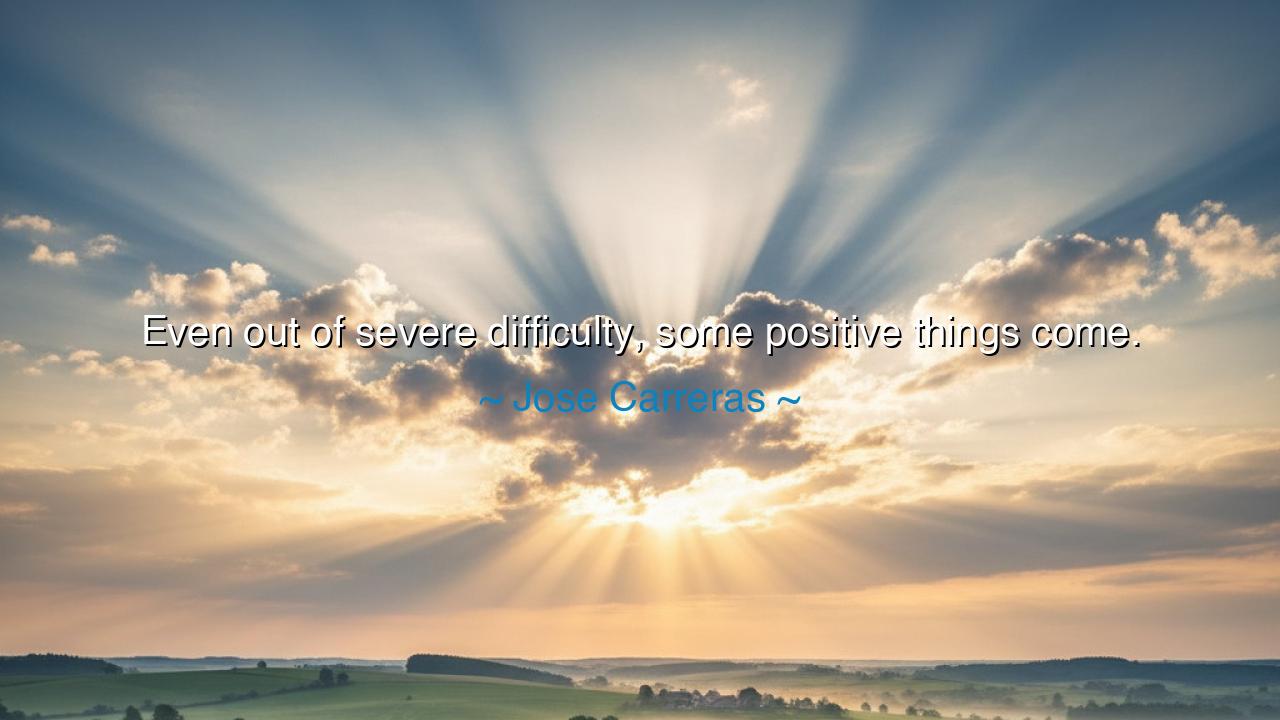
Even out of severe difficulty, some positive things come.






Jose Carreras, the great tenor who faced illness and rose again to sing, once declared: “Even out of severe difficulty, some positive things come.” This saying is not a shallow optimism, but a truth written in the very fabric of existence. For life is not without storms; the seas rise high, and the winds strike hard. Yet from the wreckage of trial, new shores are often discovered. The soul, tested and strained, discovers depths of strength and wells of gratitude that ease could never reveal.
The ancients knew this well. They taught that the furnace of trial refines the gold of the spirit. Without heat, gold remains bound in stone, unseen and unformed. So too does the soul, without hardship, remain hidden in comfort, undeveloped, fragile. Difficulty becomes the alchemy of transformation, and positive things emerge not in spite of hardship, but because of it. Carreras himself, struck with leukemia at the height of his fame, endured suffering, but later found in that struggle the foundation of his charitable works, giving hope to countless others.
Consider also the story of Viktor Frankl, who survived the horror of the concentration camps. He saw death, despair, and unspeakable cruelty. Yet out of this severe difficulty, he brought forth a truth that has comforted millions: that man’s last freedom is the power to choose his attitude in any given circumstance. From his trials came the book Man’s Search for Meaning, which has lifted spirits across the world. In his suffering, he discovered a wisdom that only the crucible of pain could forge.
This principle appears again in the history of nations. Out of the destruction of World War II, Europe rose from ashes with a new vision of unity and peace, leading to the birth of the European Union. The scars of war gave rise to reconciliation, cooperation, and progress. Out of devastation, positive things emerged, carried on the backs of those who chose not to surrender to despair but to build anew. Difficulty was not the end—it was the beginning of transformation.
The lesson, O children of tomorrow, is that hardship is not meaningless. The wound may ache, but within it lies the seed of wisdom, strength, and renewal. When you find yourself crushed by sorrow, do not say, “This is my end.” Instead say, “This is my passage.” For every trial carries within it the possibility of rebirth. The river that floods may destroy, but it also nourishes the soil, preparing the ground for richer harvests.
Practically, we can live this wisdom by training ourselves to look for the hidden gifts in hardship. When loss comes, let us ask: “What strength does this awaken in me?” When failure comes, let us ask: “What lesson is being taught?” Keep a journal of trials, not to dwell on suffering, but to trace how each difficulty gave rise to unexpected blessings. Offer help to others who suffer, for in comforting them, you transform your own pain into compassion.
So let Jose Carreras’s words be inscribed upon our hearts: severe difficulty is not a curse but a forge, and from it, if we are steadfast, positive things come. Let us then welcome hardship not as an enemy, but as a stern teacher. Let us emerge from every trial stronger, wiser, and more compassionate. For the soul that rises from difficulty becomes like the phoenix: reborn from its ashes, brighter than before, and a beacon of hope for all who walk the path after.






BNNguyen Bao Nhi
I’m struck by the optimism in this view, but I wonder how practical it is in the midst of severe hardship. How does Carreras suggest people focus on potential positives without minimizing the difficulty they face? Could there be strategies or practices that help individuals notice these opportunities for growth or benefit even in very painful circumstances? It also raises a question about whether certain types of difficulty are more likely to yield positive outcomes than others.
NMLe Ngoc Nhu My
This statement encourages reflection on growth through adversity, which resonates deeply. I’m curious about whether he sees these positive outcomes as unexpected surprises or as lessons we can intentionally cultivate. How does one differentiate between serendipitous positives and meaningful personal development? Additionally, it would be interesting to explore whether he believes these positive aspects are equally accessible to everyone, or if factors like support systems and mindset play a critical role.
HD11_1-Nguyen Hai Duong
Reading this makes me think about the balance between hope and realism. While it’s comforting to believe that positive things can come from hardship, is there a risk of oversimplifying suffering or invalidating genuine pain? I’d like to ask how he reconciles difficult experiences that have no apparent positive outcome. Does he see this principle as universally applicable, or more as a reflection of personal experience and attitude?
TTLe Thanh Truc
This idea raises questions about the role of perspective in dealing with adversity. Are the positive outcomes inherent to the difficulty itself, or do they emerge because of how we respond to challenges? I wonder if Carreras believes that every hardship carries potential growth, or if some situations are simply tragic without a redeeming aspect. Understanding how he distinguishes between inevitable hardship and opportunities for positive transformation could provide a deeper insight into his worldview.
HTHien Tran
I find this statement inspiring but also a bit challenging. In severe difficulties, it’s often hard to see any positive outcome. I’m curious about what kinds of positive things he has personally experienced in the face of major obstacles. Does he mean tangible achievements, emotional resilience, or perhaps lessons learned? Also, how does one cultivate the mindset to notice and embrace these positives even when the situation feels entirely negative?